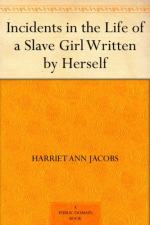The day patrol continued for some weeks, and at sundown a night guard was substituted. Nothing at all was proved against the colored people, bond or free. The wrath of the slaveholders was somewhat appeased by the capture of Nat Turner. The imprisoned were released. The slaves were sent to their masters, and the free were permitted to return to their ravaged homes. Visiting was strictly forbidden on the plantations. The slaves begged the privilege of again meeting at their little church in the woods, with their burying ground around it. It was built by the colored people, and they had no higher happiness than to meet there and sing hymns together, and pour out their hearts in spontaneous prayer. Their request was denied, and the church was demolished. They were permitted to attend the white churches, a certain portion of the galleries being appropriated to their use. There, when every body else had partaken of the communion, and the benediction had been pronounced, the minister said, “Come down, now, my colored friends.” They obeyed the summons, and partook of the bread and wine, in commemoration of the meek and lowly Jesus, who said, “God is your Father, and all ye are brethren.”
XIII. The Church And Slavery.
After the alarm caused by Nat Turner’s insurrection had subsided, the slaveholders came to the conclusion that it would be well to give the slaves enough of religious instruction to keep them from murdering their masters. The Episcopal clergyman offered to hold a separate service on Sundays for their benefit. His colored members were very few, and also very respectable—a fact which I presume had some weight with him. The difficulty was to decide on a suitable place for them to worship. The Methodist and Baptist churches admitted them in the afternoon; but their carpets and cushions were not so costly as those at the Episcopal church. It was at last decided that they should meet at the house of a free colored man, who was a member.
I was invited to attend, because I could read. Sunday evening came, and, trusting to the cover of night, I ventured out. I rarely ventured out by daylight, for I always went with fear, expecting at every turn to encounter Dr. Flint, who was sure to turn me back, or order me to his office to inquire where I got my bonnet, or some other article of dress. When the Rev. Mr. Pike came, there were some twenty persons present. The reverend gentleman knelt in prayer, then seated himself, and requested all present, who could read, to open their books, while he gave out the portions he wished them to repeat or respond to.
His text was, “Servants, be obedient to them that are your masters according to the flesh, with fear and trembling, in singleness of your heart, as unto Christ.”




